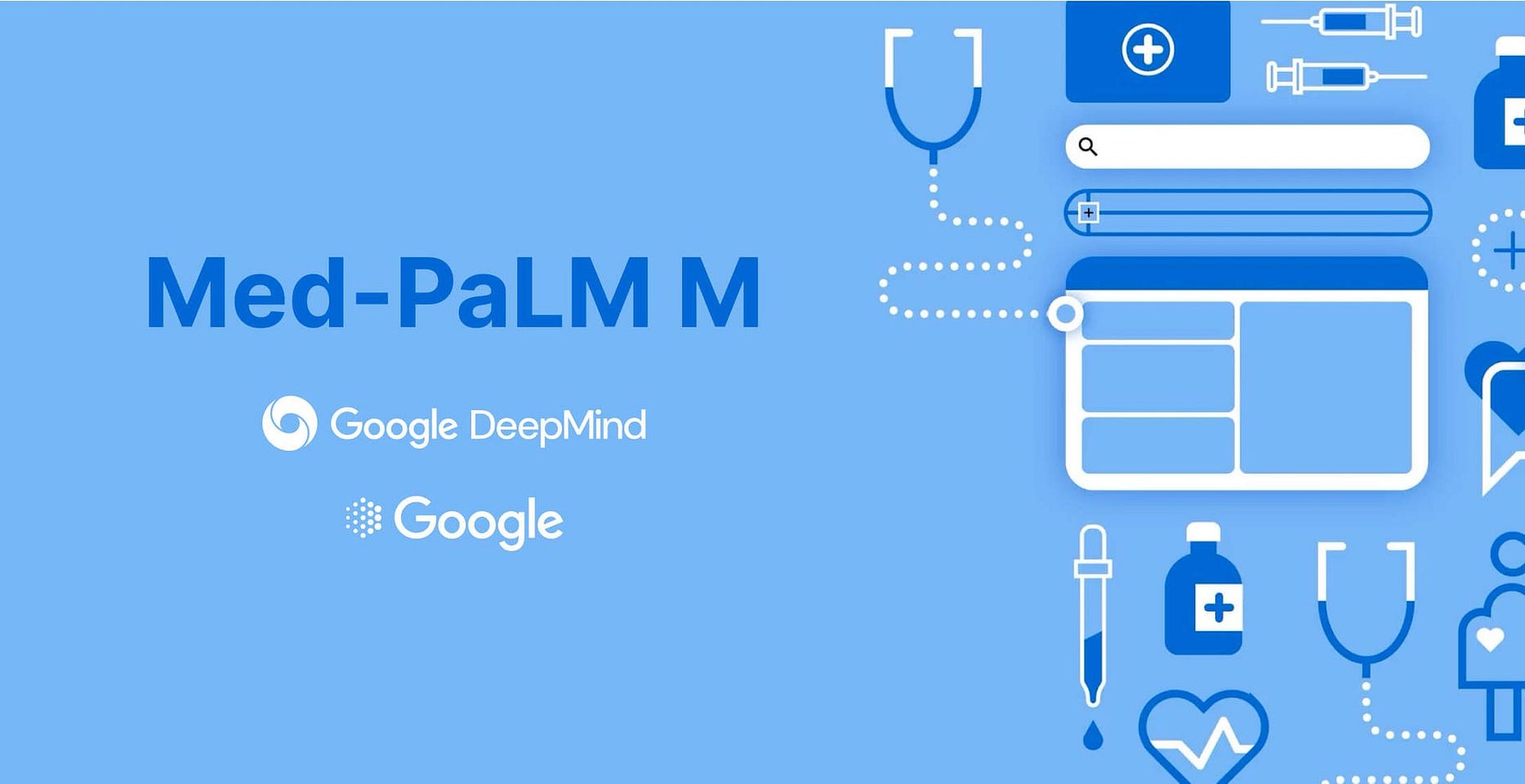the health strategist
review
health management, engineering
and technology review
Joaquim Cardoso MSc.
Chief Research and Strategy Officer (CRSO);
Chief Editor and Senior Advisor
August 1, 2023
What are the key takeaways?
Med-PaLM M is a Multimodal Biomedical AI from Google Research and Google DeepMind.
- It encodes and interprets diverse medical data types (text, images, genomics) within the same model architecture.
- Med-PaLM M is built on PaLM-E, a generalist AI model with strong performance on language, vision, and multimodal tasks.
The researchers curated MultiMedBench, a multimodal medical dataset with over 1 million examples spanning 14 tasks, to enable Med-PaLM M’s development and benchmarking.
- Med-PaLM M surpassed state-of-the-art performance on all benchmark tasks, often outperforming specialized models by a wide margin.
It represents a paradigm shift in biomedical AI, offering a flexible model that can understand connections across modalities, improving diagnostic and predictive accuracy.
- Med-PaLM M demonstrated zero-shot multimodal reasoning, identifying and describing medical concepts it hadn’t encountered before using language-based instructions.
Clinical evaluation showed that Med-PaLM M’s error rate was comparable to radiologists, suggesting potential clinical utility.
- The model showed promising potential in downstream data-scarce biomedical applications.
The development of Med-PaLM M has introduced a new multimodal biomedical benchmark and demonstrated the first generalist biomedical AI system with competitive performance.
- The work by Google Research and Google DeepMind is a significant advancement in the field of biomedical AI, with broad applications in biomedical discovery and care delivery.
DEEP DIVE

Med-PaLM M is a Multimodal Biomedical AI from Google Research and Google DeepMind
Across all tasks in the benchmark, Med-PaLM M reached or exceeded state-of-the-art performance, often surpassing specialized models optimized for individual tasks by a wide margin.
Maginative
CHRIS MCKAY
JULY 31, 2023
Researchers from Google and DeepMind have unveiled Med-PaLM M, the first demonstration of a generalist multimodal biomedical AI system. Med-PaLM M encodes and interprets diverse types of medical data spanning text, images, genomics and more — all within the same model architecture. This development highlights the potential of flexible, general-purpose AI systems to unlock new capabilities in biomedicine.
To enable the development and benchmarking of Med-PaLM M, the researchers curated MultiMedBench — a new multimodal medical dataset spanning 14 tasks across modalities including text, medical imaging, and genomics. MultiMedBench contains over 1 million examples for question answering, report generation, classification, and other clinically relevant tasks. This comprehensive benchmark was key to training and evaluating Med-PaLM M’s capabilities across diverse biomedical applications.
Med-PaLM M is built on PaLM-E, a recently introduced generalist AI model capable of strong performance on language, vision and multimodal tasks. By further training PaLM-E using MultiMedBench, the researchers adapted it into a versatile system for biomedical applications.
Across all tasks in the benchmark, Med-PaLM M reached or exceeded state-of-the-art performance, often surpassing specialized models optimized for individual tasks by a wide margin.
Med-PaLM M is not just about setting new performance benchmarks. It signifies a paradigm shift in how we approach biomedical AI. A single flexible model that can understand connections across modalities has major advantages. It can incorporate multimodal patient information to improve diagnostic and predictive accuracy. The common framework also enables positive transfer of knowledge across medical tasks. In an ablation study, excluding some training tasks hurt performance, demonstrating the benefits of joint training.
Preliminary evidence suggests that Med-PaLM M can generalize to novel medical tasks and concepts and perform zero-shot multimodal reasoning, all through language-based instructions and prompts. For instance, the model has been found to accurately identify and describe tuberculosis in chest x-rays despite having never encountered presentations of the disease before in images.
To assess the clinical applicability of Med-PaLM M, a radiologist evaluation of AI-generated reports across model scales was conducted. The clinically significant error rate for Med-PaLM M was found to be on par with radiologists from prior studies, suggesting potential clinical utility. In a side-by-side ranking on 246 retrospective chest X-rays, clinicians expressed a pairwise preference for Med-PaLM M reports over those produced by radiologists in up to 40.5% of cases.
While significant work remains to validate these models in real-world use cases, the results achieved by Med-PaLM M represent a milestone towards the development of generalist biomedical AI systems. The development of Med-PaLM M has not only introduced a new multimodal biomedical benchmark, but also demonstrated the first generalist biomedical AI system that reaches performance competitive with or exceeding state-of-the-art specialist models on multiple tasks.
Evidence of novel emergent capabilities in Med-PaLM M, such as zero-shot medical reasoning, generalization to novel medical concepts and tasks, and positive transfer across tasks, hint at the promising potential of such systems in downstream data-scarce biomedical applications.
The work done by the teams at Google Research and Google DeepMind is a significant leap forward in the field of biomedical AI, paving the way for AI systems that can interpret multimodal data with complex structures to tackle many challenging tasks. As biomedical data generation and innovation continue to increase, the potential impact and applications of such models are expected to broaden, spanning from fundamental biomedical discovery to care delivery.
Originally published at https://www.maginative.com on July 31, 2023.












